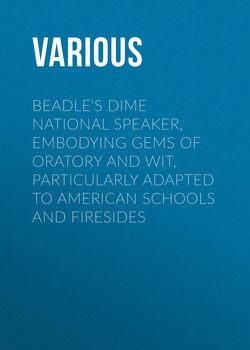Читать книгу Beadle's Dime National Speaker, Embodying Gems of Oratory and Wit, Particularly Adapted to American Schools and Firesides - Various - Страница 10
THE SCHOLAR'S DIGNITY. – Hon. George E. Pugh July 5th, 1859
ОглавлениеThe purpose of all genuine effort, beyond the satisfaction of physical wants, should be to enlarge the compass of human sympathy and desire, to purify, elevate, ennoble the intellectual constitution of our race. God has so created us that these results can be attained by simple and even direct agencies. Man is a sympathetic being; and the full discharge of his obligation toward his own family, his friends, his neighbors, is the method by which he can best discharge his duty in other relations; toward God and his country, toward the millions of his fellow-beings now alive, and the millions who will inherit the earth in a course of ages. Hence arise man's real pleasures, and (not less) his noblest responsibilities and actions. But, as our nature is composed of appetites and passions which rightly adjusted, each with another, lift us almost to the dignity of the Godhead, but when disorganized, show us to be meaner than the brutes; so civil society, or the association of mankind pursuant to the Divine order, while capable, in its normal state, of the utmost happiness for all its members, is now disorganized and demoralized, its sweet bells of sympathy turned to discord, even its charities stained by selfishness and base pretension; its capacities for good entirely perverted to the oppression, to the cruel debasements of the multitude, and to the unjust advantage of a few. Here is the field of chivalry for him – scholar and squire who would be something more – conscious of his earnest duty, of the vast rewards which must crown success, and alive to the inspiration of all the past, the present, and the future; here is a field on which he may win the gilded spurs of knighthood, and where, with his own arm, he can truly redress the innocent, rescue the unfortunate, and reclaim even the oppressor to a recognition of the rights of the oppressed. Or, if he would choose a holier part, although less conspicuous, it may be, let him join that valiant array of pioneers which is marching now (as, in time past, it ever has marched) at the head of the generation; hewing down primeval forests of ignorance; bridging the torrents of crime; leveling mountains of doubt and difficulty; filling up quagmires of sorrow; that so, in age after age, the hosts of pilgrims from the cradle to the grave shall traverse their distance without harm, and measurably anticipate, if not realize, the beatitude of toil forever accomplished.
In a true sense, the scholar is a king of the noblest power. Not his that dominion which exercises itself over the bodies of men, subduing alike their happiness and their will, making of his fellow-creatures a mere sport or convenience, but that dominion which exists by the full consent of the governed, and without which, in reality, their happiness and peace can not be secured. [Nam, uti genus hominum compositum ex anima et corpore, ita res cunctæ, studiaque omnia nostra, corporis alia, alia animi naturam sequuntur. Igitur, præclara facies, magnæ divitiæ, ad hoc vis corporis, alia hujuscemodi, omnia brevi dilabuntur; at ingenii egregia facinora, sicuti anima, immortalia sunt. Postremo, corporis et fortunæ bonorum, ut initium, finis est: omnia orta occidunt, et aucta senescunt: animus incorruptus, æternus, RECTOR HUMANI GENERIS, agit atque habet cuncta, neque ipse habetur.] The liberty of men does not stand in rebellion against the truth, nor against the truly-anointed genius of the age:
Unjustly thou depravest it with the name
Of servitude, to serve whom God ordains,
Or Nature; God and Nature bid the same,
When he who rules is worthiest, and excels
Them whom he governs. This is servitude,
To serve th' unwise, or him who hath rebell'd
Against his worthier.
